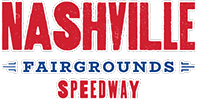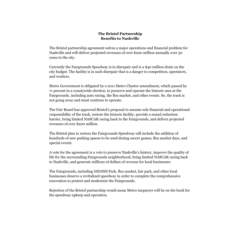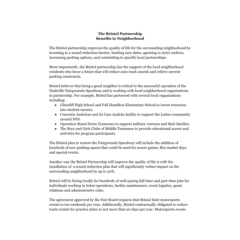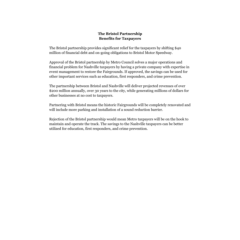Answers to Frequently Asked Questions about the Nashville Fairgrounds Speedway Project.
Currently the Fairgrounds Speedway is in disrepair and has amassed more than $40 million deferred maintenance backlog (and growing) and has become in such a state of disrepair that is a danger to competitors, spectators, and workers.
The Bristol partnership agreement solves a major operations and financial problem for Nashville and will deliver projected revenues of over $200 million annually to the city, while generating millions of dollars for other businesses at no cost to taxpayers.
The Bristol partnership improves the quality of life for the surrounding neighborhood by investing in a sound reduction barrier, limiting race dates, agreeing to strict curfews, increasing parking capacity for non-racing events, and committing to specific local nonprofit partnerships.
More importantly, the Bristol partnership has the support of the local neighborhood residents who favor a future that will reduce auto track sounds and relieve current parking constraints. Bristol believes that being a good neighbor is critical to the successful operation of the Nashville Fairgrounds Speedway and is working with local neighborhood organizations in partnership.
Bristol has partnered with several local organizations including:
- Glencliff High School and Fall Hamilton Elementary School to invest resources into student success.
- Conexión Américas and its Casa Azafrán facility to support the Latino community around NFS.
- Operation Stand Down Tennessee to support military veterans and their families.
- The Boys and Girls Clubs of Middle Tennessee to provide educational access and activities for program participants.
There will be one NASCAR Cup race weekend, every other year.
The number of motorsports events held at the property WILL NOT INCREASE the current schedule 10 motorsports event weekends. The new agreement would significantly reduce the number of track rental days down to 20 a year.
The Bristol partnership provides significant relief for the taxpayers by shifting $40 million of financial debt and future capital improvement obligations to Bristol Motor Speedway. If approved, the savings can be used for other important services such as education, first responders, and crime prevention.
Approval of the Bristol Partnership by Metro Council solves a major operations and financial problem for Nashville taxpayers by having a private company with expertise in event management to restore the Fairgrounds.
The Bristol partnership will generate $200 million annually in economic activity, according to an analysis by Tourism Economics, a division of Oxford Economics.
Everything but its history. The speedway is falling apart and is dangerous for competitors, spectators, and workers. The grandstands are old, dangerous, and not ADA compliant. The bathrooms are truly disgusting and unsanitary. The track itself, including the safety walls have major cracks and are structurally compromised. The track is unsafe for competitors and spectators.
[click for more info]
You can contact your council member and tell them to shift the financial burden away from the taxpayers and have Bristol restore the track, build a sound barrier, and provide well paying jobs for the community.
[click for more information]
Yes. Many Bristol employees helped to restore and operate the May 2023 NASCAR All-Star Race at the historic North Wilkesboro Speedway, which was closed in the late 1990s. Bristol’s parent company, Speedway Motorsports completely restored it this past year.
Rejection of the Bristol partnership would mean Nashville taxpayers will be on the hook for maintenance and operation of the track, which is projected to be in excess of $40 million. For the local neighborhood, it means that there will be no funds available for a sound reduction barrier, additional parking or hundreds of new jobs.
Metro Government is obligated by a 2011 Metro Charter amendment, which passed by 72 percent in a countywide election, to preserve and operate the historic uses at the Fairgrounds, including auto racing, the flea market, and other events. So, the track is not going away and must continue to operate.
A vote for the agreement is a vote to preserve Nashville’s history, enhance the surrounding Fairgrounds neighborhood, bring limited NASCAR racing back to Nashville, and generate millions of dollars of revenue for local businesses.
The Fairgrounds, including GEODIS Park, flea market, fair park, and other local businesses deserve a revitalized speedway in order to complete the comprehensive renovation to protect and modernize the Fairgrounds.
Yes, there will be hundreds of more parking spaces available for soccer games, concerts, the flea market and other special events.
Yes. Bristol will be hiring locally for hundreds of well-paying full-time and part-time jobs for individuals working in ticket operations, facility maintenance, event logistics, guest relations and administrative roles.
- BMS + NCVC Rent + Sponsorship = Approx. $78 Million
- State of TN + NCVC Grant = $34 Million
- Ticket Tax + User Fees (projected) = $130 Million
No Metro General Fund dollars would be used.
No. Nashville will continue to own the track and the Fairgrounds. Bristol Motor Speedway is proposing to lease and manage the Speedway from the city of Nashville. Under that agreement BMS would assume the responsibility for operations and maintenance of the Speedway.
Bristol’s vision is to restore, modernize and revitalize NFS in a way that respects its history, Fairgrounds, and the neighborhood. Bristol will create a multipurpose venue that generates more revenue, not more racing, by featuring more non-racing events that are attractive to residents and create economic vibrancy for the Fair Board and the city.
Final calculations of the economic impact have not been completed yet, but in other similar markets where NASCAR holds its races, one NASCAR Cup Series weekend typically generates more than $200 million in economic impact.
The Speedway needs comprehensive modernization. Improvements will be made for driver and spectator safety, noise mitigation, plus expansion and updates to spectator seating. New audio/visual systems will enhance the spectator experience. New facilities will be constructed for storage, maintenance, and operations. Improvements to the infield also will allow for the facility to be used more easily by other community events.
As one of the most visited cities in North America, Nashville has plenty of need for venues to host special events. In many markets, auto racing venues also host a multitude of non-racing events including, auto shows, bicycle races and corporate events. There will also be opportunities made available for community organizations to utilize the facility for special events.
The Bristol partnership will improve the overall experience at the Fairgrounds. Once the Speedway is renovated, it can be better utilized for a few biennial uses including additional parking and special events. The Board of Fair Commissioners will continue to oversee and schedule uses of the Fairgrounds’ expo buildings and other facilities.
Nashville Superspeedway is in Lebanon, TN.
Track size will remain the same, though spectator capacity will be increased from about 14,000 to 30,000. After the expansion, the Nashville Fairgrounds Speedway will be the smallest capacity track on the NASCAR circuit, creating a unique and intimate viewing experience.
It is still early in the planning stages, but once construction begins, we estimate it should take no more than 18 months to complete the proposed improvements.
Yes. In addition to a limitation on the number of days per year, there will be a limit on operating hours. Most races will be held during the day and all motorsports events, with limited exceptions, will end by 10 p.m.
There will be several benefits as a result of a renovation including the addition for ADA compliant access from Craighead St. to the larger Fairgrounds facilities "at the top of the hill".
This access will allow for an additional inclusive method of ingress and egress to all of the Fairgrounds’ facilities including the Expo buildings, the soccer stadium and the racetrack. It has not yet been funded but would be part of the speedway renovation project.
Bristol Motor Speedway, in conjunction with the Fairgrounds, will maintain a comprehensive and up to date schedule and website of all motorsports events. We have been told that a lack of transparency has been an issue in the past, therefore BMS is committed to being fully transparent regarding the schedule of motorsports events, including practices and test sessions, held at the speedway. As an example, BMS routinely shares schedule announcements between the months of October and January leading into the New Year.
Yes, a public meeting will be held in July. To date, we have held dozens of public meetings with more to come.
Sound engineers project a 50% reduction in the sound impact to the neighborhood.
Bristol has unparalleled expertise in event management including parking for major events. The company will work with the Board of Fair Commissioners, Nashville SC, and all local government authorities to create a comprehensive plan that allows for efficient ingress, egress and parking for attendees at events hosted at the racing facility.
Event scheduling will be coordinated by the Fairgrounds Executive Director with BMS, NASCAR, Nashville SC and MLS to ensure that scheduling conflicts like this do not occur. BMS has extensive experience working with outside groups to coordinate event schedules. BMS will work with all entities and do all within their control to assure that there are not scheduled races at the same time as soccer matches, or other large events at the Fairgrounds.
Yes. Staffing for new operations will require hiring new full-time employees. It’s anticipated that the future race and special events schedule will generate hundreds of seasonal, part-time jobs. The increased activity also provides opportunities for non-profit organizations to make money for their causes by working in parking, concessions, premium seating support or ushers.
Yes. The local racing program on both the 1/4 mile and 5/8-mile tracks will continue to be an important part of the Nashville Fairgrounds Speedway’s operations.




